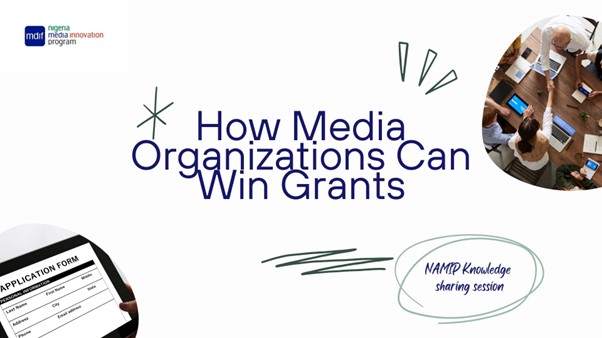By Temitayo Akinyemi
As donor funding for media continues to decline, securing the right grants continue to be an essential strategy for sustaining journalism initiatives. Recognizing this need, The Nigeria Media Innovation program (NAMIP), invited Centre for Journalism Innovation & Development (CJID)’s Partnerships & Grants Manager, Bisan Habu to lead a workshop on grant-making and proposal writing for NAMIP participants. The session offered participants actionable strategies for crafting persuasive proposals and sourcing grants, helping media organizations diversify their income streams and fund important projects.
Understanding the Grant Landscape
The workshop touched on the growing importance of grants as a viable additional funding source for media organizations. As digital transformation and innovation become priorities for many funders, finding alignment between your organization’s goals and aligning these trends can increase your chances of success. Grants—whether from government agencies, foundations, or private-sector initiatives—are non-repayable financial awards aimed at supporting specific projects, and they can be pivotal in diversifying revenue for media outlets.
The 5-Step Process to Winning Grants Proposals
Bisan introduced a five-step approach to writing winning grant proposals:
- Identify the Right Opportunities: Organizations must ensure that potential grant opportunities align with their goals and requirements. Researching the background of funders and understanding their priorities is crucial for targeting the right opportunities.
- Problem Definition and Ideation: A strong proposal begins with a clear definition of the problem your project will address, supported by a SMART (Specific, Measurable, Achievable, Relevant, Time-bound) solution.
- Developing a Persuasive Proposal: Crafting a proposal that highlights how your organization’s goals and objectives meet the specific needs and expectations of funders is key. Bisan emphasized aligning the proposal narrative with the funder’s objectives while highlighting the unique strengths of your organization.
- Submitting Early: To mitigate risks, Bisan recommends submitting your proposal no later than 48 hours before the deadline. This gives you ample time to address last-minute technical issues or refine the application.
- Tracking and Improving Applications: Continuous learning is crucial. Monitor the status of submitted applications and gather feedback, using it to improve future proposals.
Preparing for Grant Success
Bisan highlighted that building a robust database of funders and understanding their specific focus areas is a key to long-term success and understanding which grants fall within an organization’s scope of coverage.
The session concluded with a focus on the practical aspects of preparing a successful grant proposal. From refining the problem statement to ensuring the proposal aligns with both organizational goals and funder priorities, participants gained valuable tools to increase their chances of success. The insights shared by Bisan Habu underscore the need for a strategic, well-researched app

